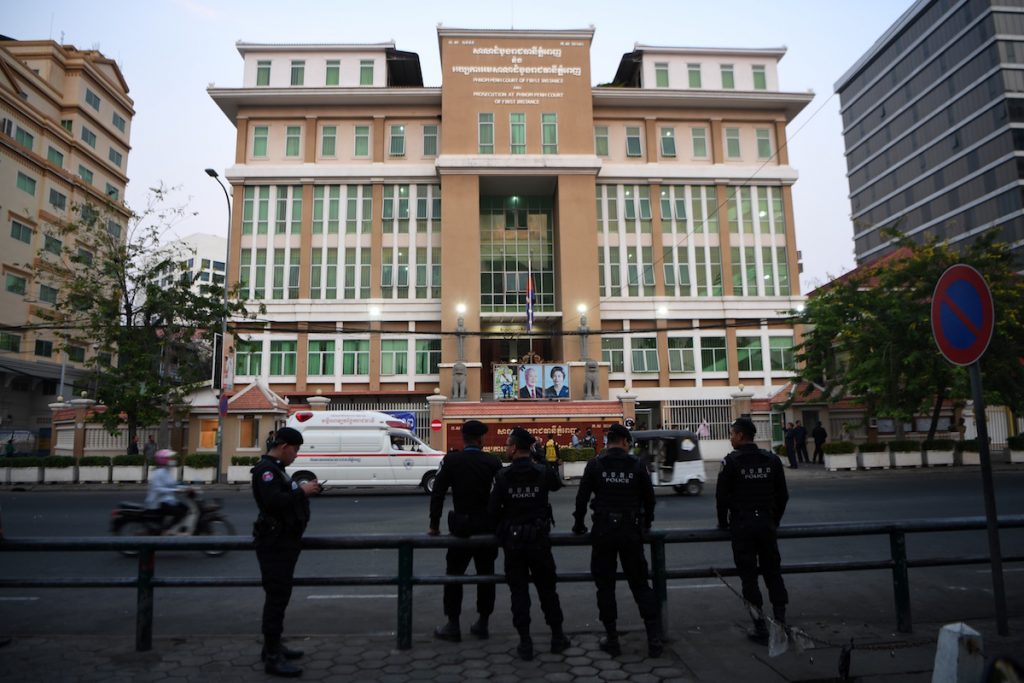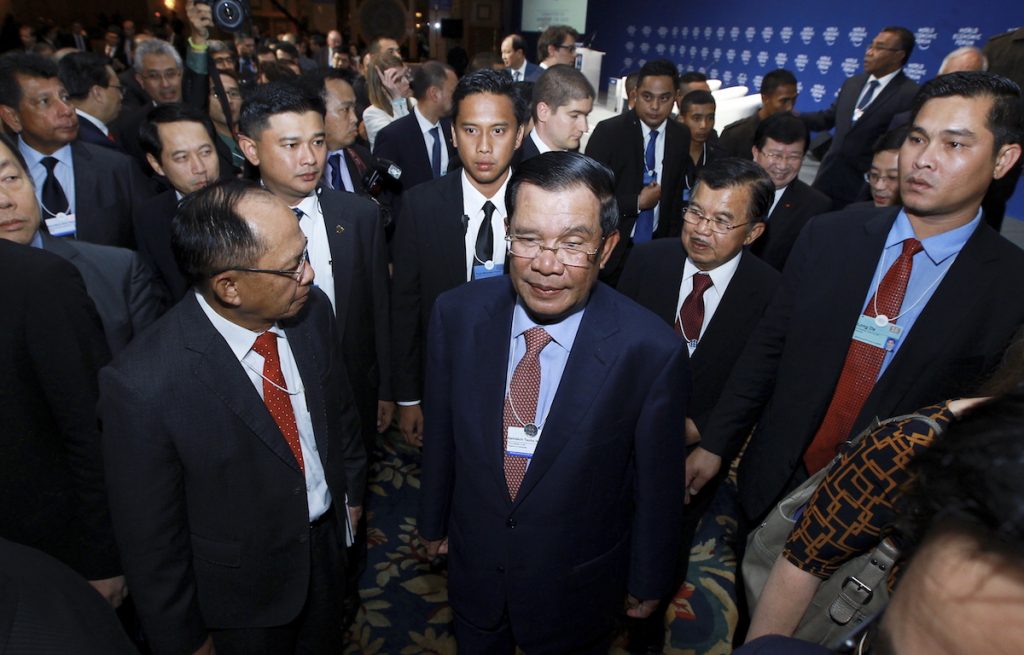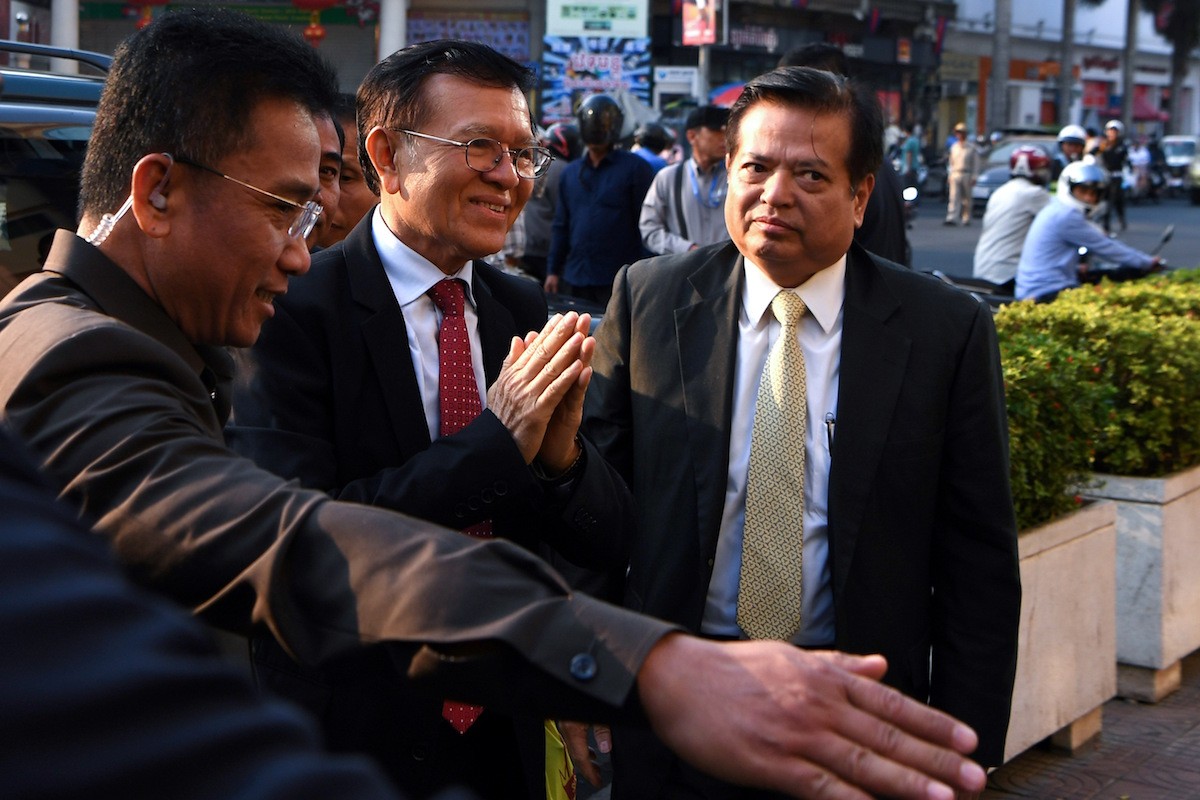On Jan. 22, Kem Sokha stepped out of his house in Phnom Penh to speak with a group of reporters that had gathered nearby. The Cambodian opposition leader wanted to take a moment to tell them that the treason accusations against him are false.
“All the activities that I have done are in line with the Paris Peace Agreements from 1991 and with the Cambodian Constitution from 1993,” he said.
Moments later, the former president of the Cambodian National Rescue Party (CNRP), for several years the most serious challenger to Prime Minister Hun Sen’s long-ruling Cambodian People’s Party, drove away in his car for another day at the Municipal Court in Phnom Penh.
Sokha, controversially, has been accused of planning to topple the government with assistance from abroad. If convicted, he is facing up to 30 years behind bars.
Sokha is far from the first critic of Hun Sen’s government to be put on trial. Over the past two decades, Cambodia has built up a long and ever growing list of legal cases that are widely seen as politically motivated. These include proceedings against prominent opposition leaders of the CNRP, as well as charges made against Buddhist monks, trade union leaders, journalists, political analysts, human rights activists, and others.
“It’s a (legal) form of intimidation against the opposition and the Cambodian people,” Paul Chambers, a political analyst and lecturer of politics at Thailand’s Naresuan University, told LiCAS.news. “It’s a way for Hun Sen to make sure that he remains in power, and to make sure his enemies stay at bay.”
Yeang Sothearin and Uon Chhin can attest to this.
The former reporters for Radio Free Asia (RFA) were arrested in November 2017 on espionage charges. A verdict in the controversial case against them, which has been criticized due to a lack of evidence, was expected to be announced in August 2019. But that verdict was delayed, and in October a judge called for a controversial reinvestigation into the charges against the reporters.
On Jan. 28, an appeals court in the capital Phnom Penh rejected a complaint that challenged the re-investigation, once again lengthening Sothearin’s and Chhin’s time in limbo.
“The investigating judges have worked long enough on this,” Sam Chamroeun, the lawyer for the RFA reporters said in front of the Appeal Court last week. “They investigated for over 16 months, but didn’t find that my clients are guilty. So they should stop it, otherwise it will impact my clients’ rights.”

Corruption
In international rankings that monitor corruption and the rule of law, Cambodia can often be found at the very bottom. For the Rule of Law Index compiled by the World Justice Project, an organization that researches rule of law in countries all over the world, Cambodia ranks 125 out of 126 countries. Only Venezuela has a lower score.
Cambodia isn’t doing much better in Transparency International’s anti-corruption rankings.
That NGO’s Corruption Perception Index 2019 ranks Cambodia 162 out of 180 countries, just above war-torn nations like Syria, Yemen, and Libya, making it the most corrupt country in Southeast Asia. In a recent press release, Transparency International Cambodia (TIC) called on the government to show seriousness in addressing systemic corruption.
“[If not] corruption will continue to create social injustice and development risks for Cambodia,” TIC acting executive director Pech Pisey said in a press release.
Miscarriages of justice
For her book, “Seeking Justice in Cambodia: Human Rights Defenders Speak Out”, author Sue Coffey interviewed over a dozen human rights activists who had worked for the development of Cambodia.
Coffey told LiCAS.news that most of them have suffered miscarriages of justice in their work as human rights reformers.
“The sufferings they experienced as young people drew them to careers in human rights, and for many this goes back to the days of the Khmer Rouge, and then occupation by the Vietnamese in the 1980s, before the UN (UNTAC) arrived, intending to establish a society based on principles of a liberal pluralist democracy,” Coffey said.
Coffey said that the founders of Cambodia’s first human rights agencies have all suffered threats, intimidation, and miscarriages of justice. As a result, some went into exile, while others were forced into hiding.
Coffey also gave the example of Loun Sovath, a Buddhist monk who stood up against forced land evictions.
“As a result of his work he was arrested, and on release was refused entry to any Buddhist temple in Cambodia. He lived in the offices of LICADHO (a Cambodian human rights organization) for two years, before finally being given sanctuary in an unofficial temple on the outskirts of Phnom Penh,” she said.
The result of it all is that many Cambodians have no faith in the legal system, Coffey said.
“My observation is that the average Cambodian would prefer to avoid any interaction with police and authorities, as they have no faith that their complaints will be treated justly.”

‘Kangaroo courts’
Many critics believe that the Cambodian government is directly to blame for the controversies in the country’s legal system.
In recent years, the government of Prime Minister Hun Sen, who has ruled the country since 1985, has repeatedly been accused of interfering in the court’s decisions as well as in police matters.
Political analyst Paul Chambers called it a “systemized kangaroo court.”
“And this has been going on for a long time. Go back to 2004, when trade union leader Chea Vichea was assassinated and when two scapegoats were send to prison. They were convicted because the judges were told that they had to be convicted,” Chambers said.
The two men who were found guilty of the murder of Chea Vichea were sentenced to 20 years in prison. After being locked up for over five years, both of them were acquitted by the Supreme Court due to a lack of evidence.
The assassination of the union leader remains unsolved.
As a consequence of the miscarriages of justice, many Cambodians have given up their belief in a legal system that treats everyone equally.
“For thousands of Cambodians, justice from the courts is out of reach, which is why most Cambodians would prefer not to become involved with the court system or the authorities,” Coffey said.
For those who are involved in it, such as RFA reporters Yeang Sothearin and Uon Chhin, there’s often not much they can do to get out of their perilous situation.
“It looks like they want to keep us as hostages, so that they can exchange us for something,” Sothearin said.







